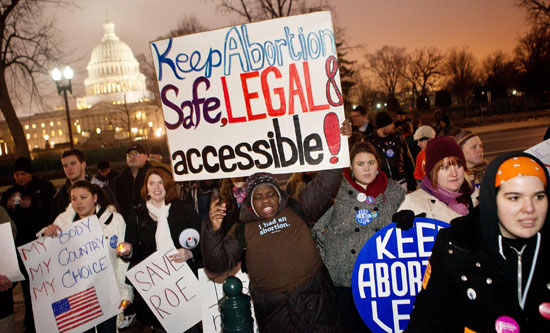
President Trump’s reinstatement of the anti-abortion Mexico City Policy, dubbed the ‘global gag rule’, is a direct attack on the lives and health of women – primarily poor and black women – around the world. The policy, introduced by US President Reagan in 1984 and subsequently twice rescinded by Democrats and bought in again by Republicans, prevents US-funded overseas recipients from discussing abortion. Trump’s position on abortion has moved rapidly from a very limited ‘pro-choice’ stance to a deeply conservative position condemning abortion – he says he ‘hates’ it – and to public support for the reactionary, Christian, large and active ‘pro-life’ movement in the US, who are overwhelmingly his supporters. Trump’s latest incarnation of the gag rule, signed on 23 January, on his fourth day in office, is even more restrictive, reactionary and dangerous than has been seen before.
An attack on global health
US foreign aid has not been able to fund abortions directly since the 1973 Helms Amendment. The Mexico City Policy goes further, preventing international non-governmental organisations (NGOs) from receiving US money if they offer abortion-related information, services or referrals. Spending from other donors cannot be used for this purpose, including in countries where abortion is legal. Trump’s additions to the rule mean that not only will the $620 million USAID money, set aside yearly for family planning, be withheld from organisations offering abortion counselling or referrals, now so will the estimated $9.5 billion for ‘global health assistance furnished by all departments or agencies’.
In addition to the scale of the reductions, the fact that NGOs most often provide integrated healthcare clinics, where people can discuss their overall health, means the gag rule will affect health provision overall. Organisations are truly gagged, forced to choose between restricting their reproductive health services or continuing to offer these vital services but run this and the rest of their programmes – immunisations, nutrition advice, health screening – on a shoestring. More than an attack on abortion, this is an attack on global health provision, on care for HIV/AIDS, malaria, the Zika virus and more.
Many NGOs responded, largely, to oppose the gag rule and to commit to access to abortion as far as they can. But this will leave huge funding gaps. Marie Stopes International responded to the announcement by declaring itself unable to partner with USAID whilst the restrictions are in place, which will have a huge impact given the scale of their work. They estimate that ‘if USAID funding continued to support family planning services delivered to our clients, we would reach approximately 1.5 million women and girls annually, preventing an estimated 1.6 million unintended pregnancies, averting 530,000 abortions (505,000 of them unsafe), and averting 5,265 maternal deaths each year.’ International Planned Parenthood Federation are among other organisations to have condemned the rule.
Those who have suffered the gag rule before will face reductions in their services again. A report by Population Action International explains the impact of the last gag rule on the Planned Parenthood Association of Ghana (PPAG). The country’s oldest and largest provider of reproductive health services lost $200,000 of USAID funding in 2003 when they rejected George W Bush’s gag rule, and were forced to lay off 67 key staff members and reduce nursing staff by 44%. This led to a 40% reduction in use of family planning services, affecting more than 1,327 communities in Ghana. This example was replicated around the world.
A rise in abortion rates will follow
When access to abortion services and information is restricted, abortion rates do not fall. Instead, more women die. The gag rule’s own history shows this. A Stanford University School of Medicine study, published in 2011 by the World Health Organisation, found that women’s chances of having an unsafe abortion were more than twice as high following the policy’s introduction. Abortion rates soared by 40% following the gag rule’s first re-introduction by George W Bush, as services that offered information on contraception and family planning as well as abortion were unable to provide for women as needed. This apparent contradiction shows the depths of racism and sexism at the heart of the gag rule.
Unsafe abortion accounts for 13% of maternal deaths around the world; a woman dies every 11 minutes because of an unsafe abortion. As Marjorie Newman-Williams from Marie Stopes International (MSI) explains ‘Every year 21.6 million women are so desperate to end their pregnancy they put their lives on the line by risking an unsafe abortion’. Alongside this, global maternal mortality is unacceptably high, with about 830 women dying from pregnancy or childbirth-related complications every day. This figure is set to rise.
Global response
Other countries, led by the Netherlands, have pledged to plug the $600 million funding gap left by the rule; a difficult and urgent task. Ultimately, the healthcare provision for millions of women around the world is largely reliant on funding from imperialist countries – political, economic and ideological changes are able to destroy access to basic healthcare overnight.
The protests and marches against Trump’s policies have been led by women, and some have linked the global gag rule with his divisive, racist, misogynistic policies at home, including his opposition to funding Planned Parenthood and limiting insurance cover of abortion. It is important that this resistance develops and continues to link racism, sexism and access to health care.
Rachel Francis




